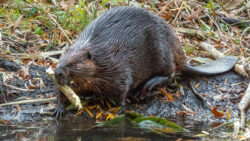The City of Ottawa may soon adopt a new way of managing the local beaver population instead of lethal trapping methods. The proposal will go to city council for a final vote next week.
The move is part of a new wildlife action plan that was approved by a joint meeting of Agriculture and Rural Affairs and Environment and Climate Change committees.
West Carleton-March Coun. Clarke Kelly urged to new management plan for the rodents including tools such as flow devices.
The plan, if adopted, will see the city maintain trapping near “municipal drains and stormwater systems.”
Ottawa kills around 150 beavers year as part of its existing management policy. In contrast, the city of London, ON only kills about two per year. Advocates have previously said seeking the installation of flow devices to mitigate flooding and keep beavers alive.
The review of Ottawa’s 2013 Wildlife Strategy was submitted to the joint committee. It outlines a 10-part plan to improve policy related to wildlife in Ottawa.
The report says that the landscape of Ottawa has changed because of more public use of greenspace, climate change, increased population density,and the prevalence of animal-transmitted diseases such as Avian flu and Lyme disease, now endemic in the community.
Part of the plan to improve Ottawa’s wildlife policy would be the creation of an advisory board of wildlife experts and service providers to meet biannually to “provide advice on the City’s wildlife information, education, and outreach activities and materials, including seasonally appropriate guidance and messages.”
The review says that habitat preservation is key.
“Protection of habitat remains the most effective tool available to the city for the reduction and management of human – wildlife conflicts,” it says.
Other actions include:
- Improved public information, outreach, and education;
- Monitoring of wildlife transmitted diseases;
- Develop an implementation plan for wildlife crossings and protection measures;
- Negotiate an agreement with Coyote Watch Canada to use its management strategy for the animals as a three-year pilot project.
Not everyone is happy with the new plan.
“The report’s recommendations to establish an advisory board of wildlife experts and service providers seems a controlled, token affair, given that it is limited to only reviewing/advising on information and education materials and meets just twice a year,” said Donna Dubreuil, President of Ottawa-Carleton Wildlife Centre, a non-profit that seeks to educate the public on wildlife, animal habitats, and their maintenance.
DuBreuil called the original report “shocking” in the kinds of the changes proposed. She pointed to the report’s allowance of beavers to continue being trapped and killed as needed, and having the advisory board not include members of the public.
“In this case, we’re hoping that the strategy proceeds in a more community oriented fashion,” said Willian van Geest, Program Coordinator at Ecology Ottawa. “We’re asking committee members here to ensure that the community voices are taken into account this time.”
“Fully six of the plan’s ten points are about (sic) conflicts, the plan’s orientation is largely towards keeping wildlife out of our way,” said van Geest.




